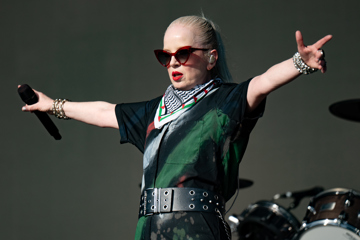It IS Time To Change The Name Of Margaret Court Arena And Here's Why
"Court took the personal and made it public and in doing so committed an act of open bigotry that should be decried."
In recent months, in what seems to be a reflection of the isolationist dog whistle rhetoric that has become increasingly commonplace in mainstream politics, a new class of clickbait has emerged: the public transport hate rant. Every few weeks a new video emerges of someone on a train or a bus hurling abuse at an unlucky target from a minority background, with statements like: "Fuck off back where you came from."
There's little ambiguity in where our moral compasses should point in these instances, and indeed, many of these verbal attacks spark police investigations as hate crimes. But should our outrage be any less total when comparable sentiments are prettied-up in the insulating ostentation of white, middle-class privilege?
Let's be clear — there is a big difference between freedom of speech and barefaced discrimination. Similarly, there is a difference between the privately held convictions of an individual and the openly expressed assertions of a public figure. These are both distinctions Margaret Court would do well to remember, as the tennis magnate and Arena namesake doubled down on her homophobic prejudices with a promise to boycott Qantas in protest of the airline's support of same sex marriage equality.
In a letter to the editor of The West Australian, printed in yesterday's edition, Court felt justified in expressing her disappointment at Qantas for being "an active promoter for same sex marriage," adding, "I believe in marriage as a union between a man and a woman as stated in the Bible. Your statement leaves me no option but to use other airlines where possible for my extensive travelling." This is by no means the worst opinion Court has openly declared about the gay community. Like many homophobes, she seemingly has a paradoxical fascination with anal sex, claiming that allowing gay relationships to go unchallenged was legitimising "what God calls abominable sexual practices, including sodomy".
Don't miss a beat with our FREE daily newsletter
Court is seemingly given a free pass to voice dangerous slurs against millions of Australians because of her social prestige.
Not for a second am I challenging Court's right to her personal beliefs, regardless of how fervently I disagree with them. But by committing those opinions to paper and submitting them for publication, Court took the personal and made it public and in doing so committed an act of open bigotry that should be decried with the same unequivocal disgust we'd aim at someone screaming their hatred in a train carriage. And yet, Court is seemingly given a free pass to voice dangerous slurs against millions of Australians because of her social prestige.
We now enter the murky world of rationalised hate, as counter arguments might step in at this point to apply some form of warped logic to legitimise Court's statements. Attacks against the LGBTQI community are the last apparently acceptable form of discrimination — it would be unthinkable to print similar comments aimed at ostracising a company based on their inclusivity of different races or (biological) genders. However, citing freedom of religion as a justification for normalising intolerance is a gross undermining of the bedrock of civil liberties. Of course, the fact that these tired arguments never hold up to scrutiny is no deterrent against those determined to righteously dig in their heels against reason. Which is why a response can't merely exist as an easily dismissed argument.
In fact, it seems more important now than ever to proactively challenge statements like Court's, as the creeping ascendency of populist politics has emboldened those on the alt-right in pushing myriad forms of exclusion and isolation in increasingly brazen ways. Power, influence and moving in the circles of the conservative elite has placed Court in an echo chamber, protected from dissenting voices that might force some objectivity. It seems any action that subverts those buffers would be a powerful tool for making those voices heard.
Several commentators responding to Court's Qantas boycott have suggested a response in kind from pro-marriage equality promoters and artists, by withdrawing from appearances at the Margaret Court Arena until its name is altered. This is a tactic that has a strong precedent. A move by British artists to boycott South Africa during Apartheid not only applied direct pressure to that regime, but also acted as a lightning rod, drawing international attention to the National Party's full-throttled embrace of racialism and its shameful reality. Make no mistake — Court's hateful comments about the LGBTQI community are as toxic and reprehensible as any similar statement about race — it is no hyperbole to make such a comparison or adopt a similar strategy for defeating it.
And if Court really is so resolute in her narrowmindedness, she would surely welcome such sanctions. After all, why would she want associations with a venue tainted by a community she clearly deems sub-human? By refusing to be tacitly complicit in Court's hate, artists can stand with their fans in solidarity in a way that Court, and others like her, cannot ignore. We are living through an age where discrimination is not only being terrifyingly legitimised, but also actively weaponised, and so any thinking, feeling person who believes that gay rights — like women's rights and the rights of people of colour — are human rights, must show zero tolerance to bigots like Court. We must resist in every way available to us, including at the box office.







